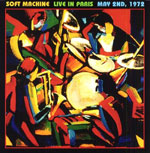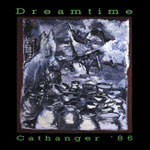SOFT MACHINE : Live In Paris (Cuneiform Records. RUNE 195/6)
DREAMTIME : Cathanger ’86 (Hux Records. HUX055)

So the music is of particular interest to Softs fans as the only extended outing by this short-lived line-up, their previous recording being confined to half an album. Also, Soft Machine in a live context have turned out to be a much more interesting prospect, developing, extending and re-shaping the compositions, in this case from their third and fifth studio efforts. It is fascinating to hear the way ‘Slightly All The Time’ has been moulded to suit the quartet and the desire, on Dean’s part at least, to improvise and stretch Mike Ratledge’s written structures. Dean’s sound may not be technically perfect on this date but it has a raw edgy tone that seems to reflect some of the tensions within the band. Marshall, though not in the mould of either Howard or the inimitable Robert Wyatt, pushes Dean and seems to be more of a force in the band than I once thought. Yes, I was with Dean and felt that Howard should have been retained !
Ratledge’s contributions as a writer began to diminish after this, which was a loss. His ‘Drop’ is a good example of his idiosyncratic style, a busy, spiky vehicle for him and Dean, the latter on electric piano, and witnessing the interplay between the two, it is a shame that their partnership came to an end not long after. Listening to the way they work together on Hopper’s ‘M.C.’ is further evidence, Dean’s toughness combines perfectly with the economic nuances of Ratledge’s rippling electric piano. It is much more focussed than the version that appeared on the fifth album.
Dean’s inclination to place improvisation before written material shows as he treats the theme of ‘Out-Bloody-Rageous’ elliptically or perfunctorily, depending on your view, and urges Ratledge’s organ solo on with choppy electric piano. When he re-emerges on alto his playing is still shaped by the essentially melodic contours of the writing. Although he was disenchanted with the band’s direction it never shows in his playing and the resulting music is charged with an immediacy that can’t be ignored.
Hopper’s ‘Facelift’ was another concert favourite and here Dean and Ratledge trade ideas across the keys before the later introduces the serpentine theme and launches into one of his famous fuzzy solos, followed by Dean’s explorations. It is a long way from the version preserved on ‘Third’ and is, in my opinion, a better representation of the band’s dynamics.
There is a sense of compromise evident in the tendency to strip compositions down to a few notes, leaving the rest for collective improvisation. This is perhaps best demonstrated by ‘As If’ where once again Ratledge’s coiling theme is soon dispensed with allowing Dean to head for open spaces. But no matter how freely he played he always retained a shapeliness and poise in his lines, never losing any of his essential melodic invention.
They end with a group improvisation, ‘At Sixes’ which, perhaps, inadvertently, hints at what may have happened had they been able to tough it out and stay together. It reveals their balance between freedom and spontaneous composition, something that vanished with Dean’s departure.
As ever, Cuneiform have done a major service to fans, and possibly others, in restoring and presenting this important document of a seminal band at a crucial point in its career.

A title like ‘Bushman’s Dance’ might suggest something up-tempo and primal but the actual music is rather stately, moving from impressionistic flutes and gentle breathy sax to the statement of a simple theme by the horns. Slightly more robust improvisations follow and I was put in mind of Edward Vesala arranging and adapting a township hymn. Nick Evans’ ‘Tip Of The Iceberg’ swiftly re-establishes the more frenetic jazz leanings of the line-up with Gary Curson’s sax and Jim Dvorak’s trumpet trading with Evan’s powerful trombone.
It’s inspiring to hear the Tippett/Evans empathy on ‘Loopin’ where the pianist uses a variety of techniques to underpin the trombonist’s playing. He moves through jagged rhythmic stabbing to thunderous chords, not forgetting those mercurial runs across the keyboard that immediately identify him. The track ends with a theme that seems to bear little relationship to what has gone before but does recall a riff that early King Crimson may have created.
No guessing the influences on ‘Chinese Hymn’. Again flutes skitter around while tiny metallic bells and cymbals softly resonate before the sax states a ‘Chinese’ motif, all very low key but direct. Tippett gets the chance to use his prepared piano, which sounds like a muted zither, extremely delicate and brittle before, once more, the track builds and Dvorak solos over the bass and drum team of Roberto Bellatalla and Jim Lebaigue. I was, again, reminded of an early Vesala composition.
Evans was also part of a great trombone duo with Radu Malfatti and it seems fitting that the band should give one of his compositions an airing. ‘Freedom Dalbe 345’ is brief, but then none of these tracks are lengthy, and manages to combine a little free playing with the strident statement of the main theme that would not have been out of place in a Brotherhood Of Breath session. A joyful way to conclude a recording that shows a band acknowledging the spirits of earlier British jazz outfits whilst adding their own distinctive voices.
© 2004 Paul Donnelly